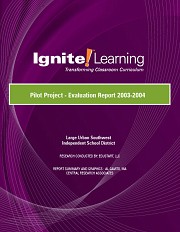Pedagogically Sound. Improved Student Achievement.
Ignite! Learning is committed to creating curriculum that is rooted in current research on the best practices for middle-school instruction.
Research-Based
The Research Base of Ignite! Learning Products In the Ignite! Learning Research Basis, Dr. Rob Foshay details how the design of the Ignite! curriculum employs research-based best practices and brain-based learning theory.
Rob Foshay, PhD, CPT
Read Dr. Foshay's bio.
|
The Ignite! Learning Method of Instructional Design Ignite! Learning has designed its curriculum to achieve the following principles:
|
| Read Ignite! Learning's Pedagogy-Science | Read Ignite! Learning's Pedagogy-Social Studies |
Efficacy Studies
Effects of Ignite! Curriculum at Title I Campuses
This study was conducted at a large urban school district that has a
high concentration of Title I campuses with students from a variety of
ethnic backgrounds. 2007 and 2008 test scores of the Stanford
Achievement Test, 10th Edition (SAT-10), were analyzed for campuses
using the Ignite! curriculum as well those not using the Ignite!
curriculum. The results show that 47% of campuses using Ignite! Science
increased their test scores, and 55% of campuses using Ignite! Social
Studies increased their test scores. Schools with increased scores saw
gains of 1.9 to 2.2 points from 2007 to 2008. Research shows that an
average gain of 1 or 2 points in one year is an educationally
significant finding. Additionally, statistically significant increases
in test scores were found at 6th & 8th grade science and at 8th grade in
social studies as demonstrated by the independent t-tests.Read the full study.
Effects of Multimedia Software on Achievement of Middle School Students in an American History Class
A study published in the peer-reviewed Winter 2008-2009 Journal of Research on Technology in Education, an ISTE publication, shows students
who used Ignite!'s multimedia curriculum increased achievement by twice as much as those who
did not.  Click here to download an abstract of the study.
Click here to download an abstract of the study. Click here to read Ignite!'s independent summary of the research.
Click here to read Ignite!'s independent summary of the research.Large Urban West Independent School District Research Project - Evaluation Report 2004-2005
During the 2004-2005 school year, this School District partnered with Ignite! Learning to examine the effectiveness of social studies learning as a result of student utilization of the Ignite! Early American History software program to augment textbook and lecture materials for seventh grade middle school history students. Click here for the findings.Brahler Study of Texas Education Agency Social Studies Texas Assessment of Knowledge and Skills Data
Dr. C. Jayne Brahler partnered with Ignite! Learning to review statewide Early American History criterion-referenced test scores for a sample of students tested in 2003-04 and in 2004-05. Dr. Brahler analyzed the performance of students in seven Texas school districts who met standard and the percentage of students who scored in the commended performance level. Click here for the findings.
Benefits of Cross-Curricular Instruction
Research shows students who make connections across content areas are learning actively and deeply. We want students regularly recognizing connections, thinking beyond disciplinary boundaries. Ignite! Learning facilitates this educational approach by providing numerous media pieces that connect math, social studies, and science.
Click here to learn more.
Read more research and news on current best practices in education.

